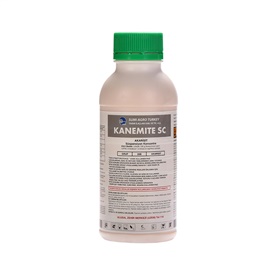

Category: PLANT PROTECTION
Type: ACARICIDE
Kanemite SC is a new active agent that also controls species that have become resistant to red spider drugs. It is a long-acting acaricide for all periods of mites.
Active substance: Contains 156 g of Acequinocyl per liter.
In group 20B
SC: (Suspension concentrate)
Advantages:
The target affects all periods of pests.
It causes sudden death due to sudden effect.
It has long lasting on the plant.
It controls red spider species that are immune to existing drugs through different mechanisms of action.
Practical Tips:
Medicated plants are not affected by rainfall after they dry well.
Do not expose to direct sunlight and do not store above 40 ° C.
Do not mix with fosetil-al and other alkaline drugs.
Plants should be sprayed in such a way as to coat thoroughly.
Repetitive applications of plant protection products with the same mechanism of action promote resistance development. Therefore, in order to delay the development of resistance, do not exceed the recommended number of applications of the plant protection product during the same production season. In cases where the application should be repeated, pay attention to the use of plant protection products with different mechanism of action.
Usage
Cucumber, eggplant and tomato red spider: Randomly selected plants in the lower and middle leaves of the plant per decare in cucumber and eggplant 10, tomatoes are counted on 20 leaves. Disinfection is performed when there are at least 5 live individuals in cucumber and eggplant per leaf and at least 3 live individuals in tomato.
Red beetle in apple: From May, counts on 100 leaves are applied when there are 8-10 live individuals / leaves.
Red spider in cherry: After harvesting, 8 to 10 live individuals / leaves are counted on 100 leaves.
Red-spider in the vineyard: The bonding areas where the second-point red-spider spreads are kept under observation.
Citrus red spider: At the end of February in early March, the upper and lower surface of the leaves with a magnifying glass are considered individuals moving. Disinfection is done when 4-9 live individuals / 10 leaves.
Red carnivorous in cloves: Ornamental planting areas are checked frequently, especially under the leaves of red carrots are sought. When local contamination is detected, medication can only be sprayed when common contamination is usually encountered in these areas, in greenhouses or outdoors.
Sosyal Ağ